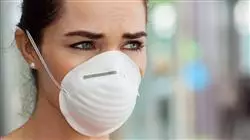University certificate
The world's largest faculty of nursing”
Introduction to the Program
Highly trained nurses will have greater opportunities to provide quality care to their patients. Don't think twice and expand your skills with us"

As in most specialties, in the case of infectious pathology, the performance of the nurse in the Emergency Department is sometimes complex and, on many occasions, decisive in the course of the disease. Therefore, the importance of a quality specialization in this field is absolutely necessary in order to be up to date with the main developments in the field.
In addition, it is necessary to take into account that, on numerous occasions, nurses must face pathologies that they had not seen before. This is especially true for imported infectious diseases which, by their very nature, do not develop naturally in all parts of the world. However, human mobility, favored by better transport conditions and mass tourism, means that health care workers, regardless of the country in which they work, may encounter patients with these pathologies.
This Postgraduate certificate deals in depth with the professional's actions in relation to infectious diseases in Emergency Departments from the point of view of early diagnosis and treatment, often empirical, but it will also include an update on imported pathology, especially in those entities that require urgent action and/or present a potential transmission capacity in our environment.
And, of course, the focus is on the main diseases affecting both residents traveling to exotic places and immigrants moving to other places, with a focus on tropical diseases such as malaria.
On the other hand, being a 100% online training, the professional will have the ability to decide when and from where to study, without commitments or obligations, thus being able to combine their study time with the rest of their daily obligations.
A highly academic program that has been designed to specialize you in this field, improving the care of your patients"
This Postgraduate certificate in Imported Infectious Diseases in the Emergency Department for Nursing contains the most complete and up to date scientific program on the market. The most outstanding features of this program are:
- The development of clinical cases presented by experts in Imported Infectious Diseases
- The graphic, schematic, and eminently practical contents with which they are created provide scientific and practical information on the disciplines that are essential for professional
- Therapeutic developments on the intervention in these diseases
- Practical exercises where to carry out the self assessment process to improve learning
- An algorithm-based interactive learning system for decision making in the clinical situations presented throughout the course
- Its special emphasis on research methodologies
- Theoretical lessons, questions to the expert, debate forums on controversial topics, and individual reflection assignments
- Content that is accessible from any fixed or portable device with an Internet connection
This Postgraduate certificate is the best investment you can make in selecting a refresher program for two reasons: in addition to updating your knowledge of Imported Infectious Diseases in the Emergency Department for Nursing, you will obtain a certificate endorsed from TECH"
It includes, in its teaching staff, professionals belonging to the field of nursing, who bring to this training the experience of their work, in addition to recognized specialists from leading scientific societies.
The multimedia content, developed with the latest educational technology, will provide the professional with situated and contextual learning, i.e., a simulated environment that will provide an immersive training experience designed to train for real life situations.
The design of this program focuses on Problem Based Learning, by means of which the nurse must try to solve the different professional practice situations that arise throughout the academic year. For this, the professional will be assisted by a novel interactive video system developed by recognized experts in the field of Imported Infectious Diseases in the Emergency Department for Nursing and with extensive teaching experience.
Take the opportunity to learn about the latest advances in Imported Infectious Diseases in the Emergency Department for Nursing and improve the care of your patients"

Increase your decision making confidence by updating your knowledge through this Postgraduate certificate"
Why study at TECH?
TECH is the world’s largest online university. With an impressive catalog of more than 14,000 university programs available in 11 languages, it is positioned as a leader in employability, with a 99% job placement rate. In addition, it relies on an enormous faculty of more than 6,000 professors of the highest international renown.

Study at the world's largest online university and guarantee your professional success. The future starts at TECH”
The world’s best online university according to FORBES
The prestigious Forbes magazine, specialized in business and finance, has highlighted TECH as “the world's best online university” This is what they have recently stated in an article in their digital edition in which they echo the success story of this institution, “thanks to the academic offer it provides, the selection of its teaching staff, and an innovative learning method aimed at educating the professionals of the future”
A revolutionary study method, a cutting-edge faculty and a practical focus: the key to TECH's success.
The most complete study plans on the university scene
TECH offers the most complete study plans on the university scene, with syllabuses that cover fundamental concepts and, at the same time, the main scientific advances in their specific scientific areas. In addition, these programs are continuously being updated to guarantee students the academic vanguard and the most in-demand professional skills. In this way, the university's qualifications provide its graduates with a significant advantage to propel their careers to success.
TECH offers the most comprehensive and intensive study plans on the current university scene.
A world-class teaching staff
TECH's teaching staff is made up of more than 6,000 professors with the highest international recognition. Professors, researchers and top executives of multinational companies, including Isaiah Covington, performance coach of the Boston Celtics; Magda Romanska, principal investigator at Harvard MetaLAB; Ignacio Wistumba, chairman of the department of translational molecular pathology at MD Anderson Cancer Center; and D.W. Pine, creative director of TIME magazine, among others.
Internationally renowned experts, specialized in different branches of Health, Technology, Communication and Business, form part of the TECH faculty.
A unique learning method
TECH is the first university to use Relearning in all its programs. It is the best online learning methodology, accredited with international teaching quality certifications, provided by prestigious educational agencies. In addition, this disruptive educational model is complemented with the “Case Method”, thereby setting up a unique online teaching strategy. Innovative teaching resources are also implemented, including detailed videos, infographics and interactive summaries.
TECH combines Relearning and the Case Method in all its university programs to guarantee excellent theoretical and practical learning, studying whenever and wherever you want.
The world's largest online university
TECH is the world’s largest online university. We are the largest educational institution, with the best and widest online educational catalog, one hundred percent online and covering the vast majority of areas of knowledge. We offer a large selection of our own degrees and accredited online undergraduate and postgraduate degrees. In total, more than 14,000 university degrees, in eleven different languages, make us the largest educational largest in the world.
TECH has the world's most extensive catalog of academic and official programs, available in more than 11 languages.
Google Premier Partner
The American technology giant has awarded TECH the Google Google Premier Partner badge. This award, which is only available to 3% of the world's companies, highlights the efficient, flexible and tailored experience that this university provides to students. The recognition as a Google Premier Partner not only accredits the maximum rigor, performance and investment in TECH's digital infrastructures, but also places this university as one of the world's leading technology companies.
Google has positioned TECH in the top 3% of the world's most important technology companies by awarding it its Google Premier Partner badge.
The official online university of the NBA
TECH is the official online university of the NBA. Thanks to our agreement with the biggest league in basketball, we offer our students exclusive university programs, as well as a wide variety of educational resources focused on the business of the league and other areas of the sports industry. Each program is made up of a uniquely designed syllabus and features exceptional guest hosts: professionals with a distinguished sports background who will offer their expertise on the most relevant topics.
TECH has been selected by the NBA, the world's top basketball league, as its official online university.
The top-rated university by its students
Students have positioned TECH as the world's top-rated university on the main review websites, with a highest rating of 4.9 out of 5, obtained from more than 1,000 reviews. These results consolidate TECH as the benchmark university institution at an international level, reflecting the excellence and positive impact of its educational model.” reflecting the excellence and positive impact of its educational model.”
TECH is the world’s top-rated university by its students.
Leaders in employability
TECH has managed to become the leading university in employability. 99% of its students obtain jobs in the academic field they have studied, within one year of completing any of the university's programs. A similar number achieve immediate career enhancement. All this thanks to a study methodology that bases its effectiveness on the acquisition of practical skills, which are absolutely necessary for professional development.
99% of TECH graduates find a job within a year of completing their studies.
Postgraduate Certificate in Imported Infectious Diseases in the Emergency Department for Nurses
TECH Global University presents the Postgraduate Certificate in Imported Infectious Diseases in the Emergency Department, a unique opportunity for nurses who want to expand their experience in the management of infectious diseases and be prepared to provide quality care in emergency situations. Our online classes offer you the flexibility to study at your own pace, from anywhere and without having to travel, while enjoying the benefits of a world-class education. In this Postgraduate Certificate, we will cover in detail the infectious diseases that can be imported and their impact on the emergency department. You will learn about the most common pathogens, methods of transmission, clinical symptoms, and prevention and control measures. Our team of experts will provide you with the necessary tools to effectively identify and manage these diseases, providing safe and efficient patient care.
Acquire specialized knowledge from the comfort of your home
Online classes offer numerous benefits for your learning. You will have access to up-to-date teaching materials, explanatory videos and practical evaluations that will allow you to consolidate your knowledge. In addition, you will be able to interact with other Nursing professionals through our online platform, sharing experiences and learning from real cases. All this, without sacrificing the quality and academic excellence that characterizes TECH Global University. Upon completion of the Postgraduate Certificate in Imported Infectious Diseases in the Emergency Department, you will have the necessary skills to identify, evaluate and make evidence-based decisions in emergency situations related to imported infectious diseases. This knowledge will allow you to provide quality Nursing services and contribute to the health and well-being of the community. Don't miss the opportunity to strengthen your professional profile and be prepared to face challenges in the Nursing field. Enroll in the Postgraduate Certificate in Imported Infectious Diseases in the Emergency Department at TECH Global University and take a step forward in your career!







